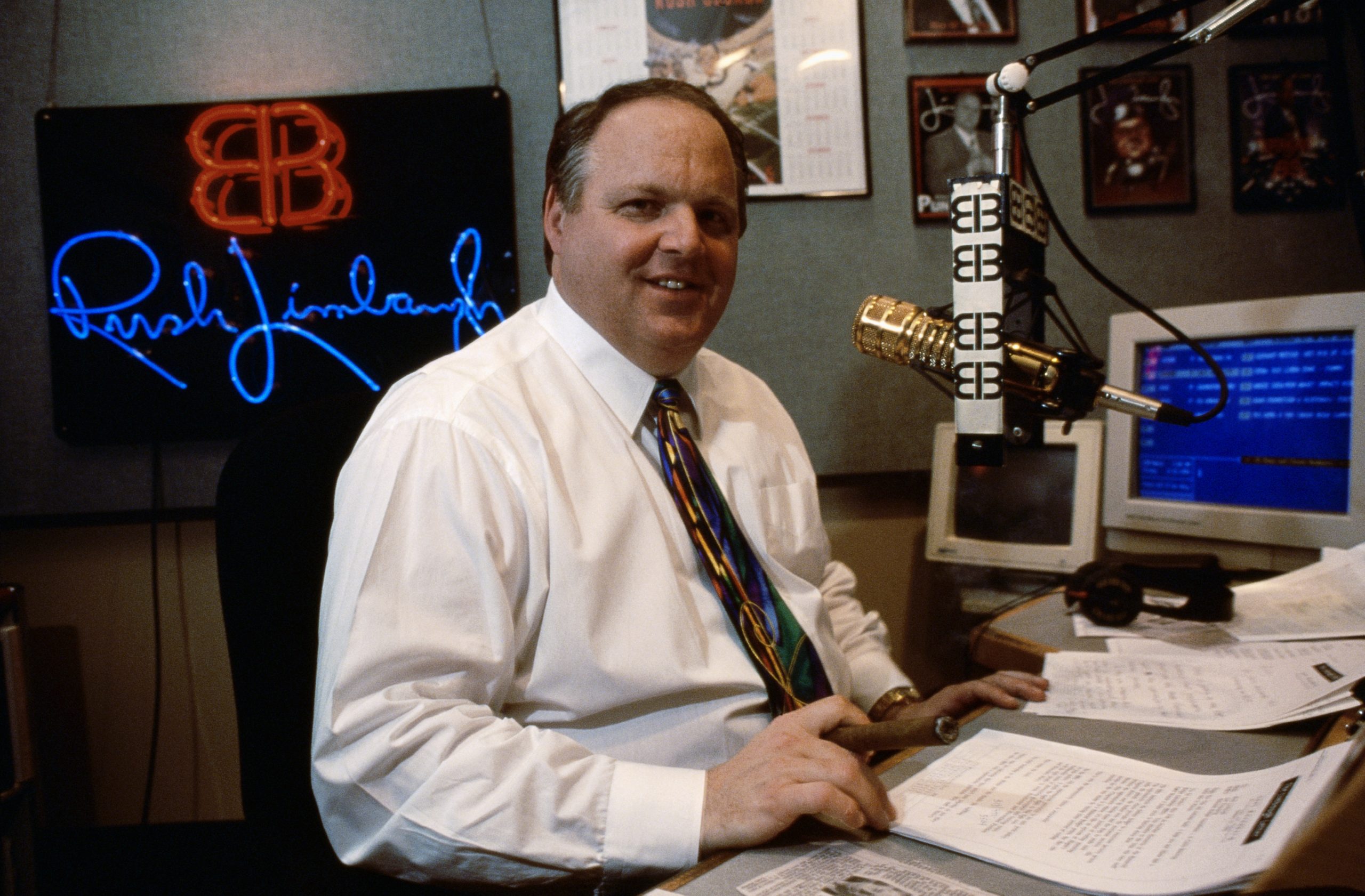With Rush Limbaugh, the Death of a Republican Kingmaker

He had a voice made for history.
Rush Hudson Limbaugh III died Wednesday, after a long battle with lung cancer. He was 70. A Presidential Medal of Freedom recipient, his death was immediately mourned by former President Donald Trump on Fox News, the first time the former commander-in-chief has granted an interview since leaving Washington last month. He died in Palm Beach, mere miles from the former president’s compound at Mar-A-Lago.
Limbaugh was the conservative godfather of a generation, a provocative pioneer of talk radio, and a power broker for elite-aspiring Republicans for decades. “You know I didn’t know Rush at all,” Trump told Fox. “And then, when we came down the escalator, he liked my rather controversial speech,” Trump said, referring to his June 2015 campaign kick-off that started his ascent to the White House.
Limbaugh was born in Missouri, at Cape Girardeau on the Mississippi River, about two hours northwest of Memphis and two hours southeast of St. Louis. In 2012, he was ushered into the Missouri Hall of Fame (with his bust granted 24-hour security). If fellow Missourian Mark Twain weaponized the novel for political impact, fans and haters alike acknowledge Limbaugh made hay of the radio.
Like many in his field, Limbaugh was essentially a lifer and got his start at a young age, dropping out of university and working as a peripatetic journeyman—in Pittsburgh, Kansas City, and Sacramento, and then New York—before striking it big. A restless and dyspeptic personality, he was fired repeatedly. He briefly got out of radio entirely, working in sports sales. But “Bachelor Jeff,” as he called himself on-air in those days, would soon become the biggest thing in Republican politics.
After turning 40, Limbaugh’s rise coalesced with Newt Gingrich’s as Republicans swept to power in Congress, taking the House for the first time in a half-century. As the new Congress was sworn in, Time magazine, still in its heyday, plastered him on the cover, in all his cigar-smoking bravado. The headline read: “Is Rush Limbaugh Good for America?”
In the years ahead, Limbaugh would become a cipher through which to gauge the success of the post-Reagan conservative movement. Adherents would laud Limbaugh’s first-rate product, monster ratings, and the contributions he made to GOP captures in Washington. But to critics, Limbaugh-style politics was part of the problem: Quietly, some would whisper about a professed Christian conservative with a nasty drug habit (and three nastier divorces), the man’s penchant for flash over policy, and his tendency to pick on individuals from pop culture, such as NFL quarterback Donovan McNabb or liberal law student Sandra Fluke, rather than really pick on Republican officials in power.
From Gingrich’s triumph and the Contract with America, to George W. Bush and the Iraq war, and finally to the ascendancy of Trump (though he initially demurred, and the former president perhaps forgets the talk-radio legend once favored Ted Cruz), Limbaugh was a loyalist to the Republican cause for 30 years, backing nearly every evolution of the party. The radio personality was a team player through every contortion of mainline conservative politics for a quarter-century, seeing little contradiction between the small-government ethos of the Nineties, the expansive War on Terror of the Aughts, the return to the small-government style in the Tens, and the sudden, populist-nationalist emergence of Trump in the current moment.
Limbaugh’s tremendous success—paired, perhaps, with hypocrisy—bedeviled the left. Allegiance to his legacy is likely to become a litmus test in the Republican Party in the coming months, and conservatives were swift to defend the deceased on Wednesday. “Wish people could honor a person who changed media forever without being cruel. You didn’t like him? Fine. Keep it to yourself for a few days,” said J.D. Vance, who may be weighing a Senate run in Ohio. “Rest in peace.”